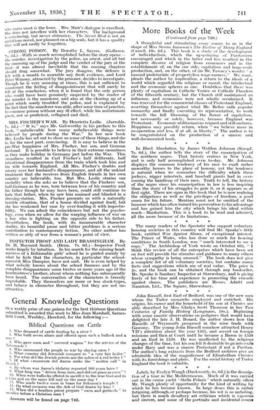In Black Manhattan, by James Weldon Johnson ( K nopf,
7s. 6d.), the author tells the story of the emancipation of the northern negro. That history centres in New York, and is only half accomplished even to-day. Mr. Johnson displays the common tendency of his race to exalt rather unworthy heroes to the place of honour, yet the tendency is natural when we remember the difficulty which these jockeys, nigger minstrels, and baseball giants had in over- coming the handicap of their race. Truth to tell, the history of the negro since his emancipation in law is less inspiring than the story of his struggles to gain it, or it appears so at first sight. There are signs in this book that he is now realizing the obligations as well as the privileges of freedom, a good omen for his future. Mention must not be omitted of the humour which has often turned his persecution to his advantage and has gained him the city which brings his ideal within reach—Manhattan. This is a book to be read and admired, all the more because of its limitations.
* • * *








































 Previous page
Previous page